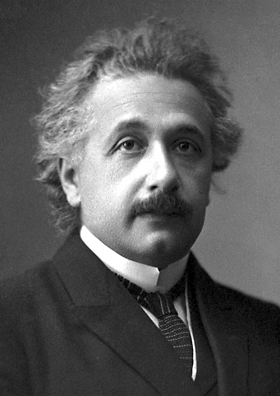
Albert Einstein was awarded the Nobel Prize in Physics on November 9, 1922, “for his services to theoretical physics, and especially for his discovery of the law of the photoelectric effect.” He was never given the Nobel for his work on the theory of special relativity, even though he had simultaneously published it with his work on the photoelectric effect in 1905.
The Photoelectric Effect
Around 1900, physicists were already well-aware that some materials could generate electricity when exposed to light. In 1883, an American inventor named Charles Fritts came up with the first functioning solar cell. However, nobody understood back then, even Fritts, how light could generate electric currents. Scientists only knew that light traveled as a wave. If this was true, then it merely caused scientists more questions about why a wave of light could create electricity.
Questions about the nature of light were answered in March 1905, when Einstein published his Nobel-winning paper on the photoelectric effect. In it, he hinted that light, perhaps, is not a wave but a particle. And as a particle, light could, therefore, possibly create electricity. He said that the photoelectric effect “…are more readily understood if one assumes that the energy of light is discontinuously distributed in space. In accordance with the assumption to be considered here, the energy of a light ray spreading out from a point source is not continuously distributed over an increasing space. Still, it consists of a finite number of energy quanta which are localized at points in space, which move without dividing, and which can only be produced and absorbed as complete units.”
Delayed Recognition Due to Prejudices
However, the late recognition of Einstein’s achievements has a dark story behind it. Einstein received the Nobel Prize 17 years after his ground-breaking theory of special relativity. That alone could have earned him recognition many years earlier. Robert Marc Friedman, a science historian, conducted exhaustive research on the matter and learned that Einstein was the victim of deliberate denial of the recognition. He said the physicist was intentionally ignored because of the prevailing bigotries of the time that worked against Jews, pacifists, and theoretical physics. Friedman says that when nominations for Einstein were submitted in 1920, the Nobel Committee members did not like the idea of a “political and intellectual radical, who—it was said—did not conduct experiments, crowned as the pinnacle of physics.” The prize for that year eventually went to a Swiss named Charles-Edouard Guillaume for discovering a type of nickel-steel alloy.
Despite Einstein’s growing popularity in 1921, a member of the committee named Allvar Gullstrand said, “Einstein must never receive a Nobel Prize, even if the whole world demands it.” This piece of information was discovered by Friedman in a Swedish mathematician’s diary. Unfortunately, Gullstrand’s opinion influenced the other committee members, and no prize was awarded for physics that year.
When 1922 came around, Einstein’s popularity soared even further. The committee members now worried that their credibility would be tarnished if they did not grant the physicist recognition. Einstein had been enjoying numerous nominations in the past two years for his work on the relativity theory, but in 1922, he had been nominated by Carl Wilhelm Oseen for his work on the photoelectric effect.
Friedman discovered that Oseen recommended the committee to recognize the photoelectric effect as a basic law of nature. According to Friedman, Oseen did this not because he admired Einstein but because he admired another physicist named Neils Bohr, and there were two available prizes for physics in 1922. Oseen then overemphasized the close link between Einstein’s law of nature and Bohr’s work on the atom and eventually was able to convince the committee. Thus, Bohr was awarded the 1922 prize and Einstein the overdue 1921 prize. However, Einstein could not attend the ceremonies because he was on his way to Japan for a series of lectures. He also needed to disappear to a faraway country because the German Foreign Minister, Walther Rathenau, had been assassinated by anti-Semites. A police investigation eventually found a list of targets with Einstein’s name on it. Friedman states that Einstein did not care about the medal but only about the prize money. The physicist used that money to keep his ex-wife and sons financially stable, and later, when one of his sons, Edouard, developed schizophrenia and had to be entered into an asylum.